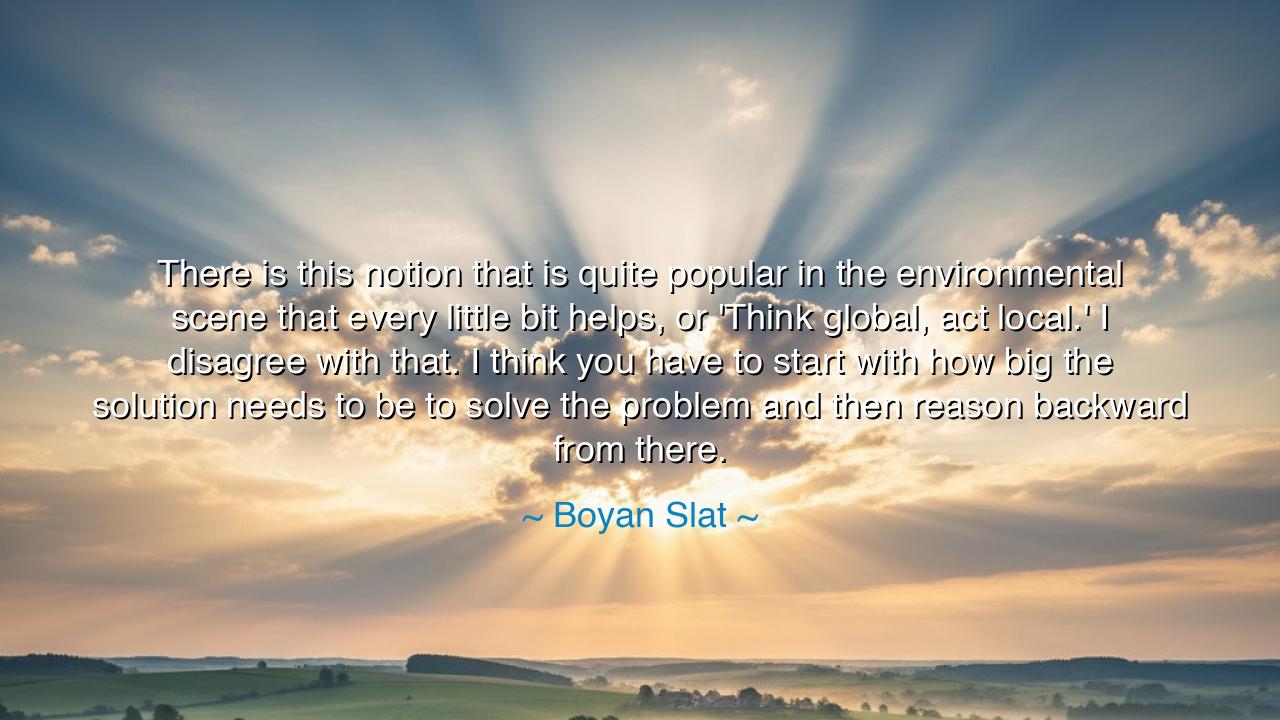
There is this notion that is quite popular in the environmental
There is this notion that is quite popular in the environmental scene that every little bit helps, or 'Think global, act local.' I disagree with that. I think you have to start with how big the solution needs to be to solve the problem and then reason backward from there.






Hear, O seekers of wisdom, the bold words of Boyan Slat: “There is this notion that is quite popular in the environmental scene that every little bit helps, or ‘Think global, act local.’ I disagree with that. I think you have to start with how big the solution needs to be to solve the problem and then reason backward from there.” In these words we hear the voice of youth unafraid to challenge convention, a spirit that looks upon the vastness of the world’s wounds and dares to answer not with timid gestures, but with visions as large as the problem itself.
The ancients taught that when a river overflows, a single cup cannot contain it. When a city is besieged, a lone shield cannot defend it. So too with the earth’s troubles: the oceans filled with plastic, the skies choked with smoke, the forests falling like silent martyrs. To say that “every little bit helps” is not false, but it risks lulling the heart into complacency. Slat warns us that small acts alone cannot solve great catastrophes. The task demands not merely individual virtue, but structural, systemic, world-shaking solutions that match the scale of the crisis.
Consider the story of the Great Wall of China. The scattered villages once defended themselves with small barricades, each believing they had done enough to resist the northern tribes. But the enemy swept through, for piecemeal defenses could not withstand united force. Only when the vision grew to match the enormity of the threat did the wall rise across mountains and plains, a solution vast enough to endure. This is the meaning of Slat’s words: to begin with the measure of the enemy—the size of the problem—and then build accordingly.
Boyan Slat himself saw this when he confronted the Great Pacific Garbage Patch, a floating continent of plastic waste. Many voices said, “Pick up trash on the beach, use fewer straws, recycle your bottles,” and while these are worthy acts, the garbage gyres remained. He asked instead: how large must the net, the system, the vision be to cleanse the seas themselves? From this question he reasoned backward, and from this reasoning came The Ocean Cleanup project, born not of small gestures, but of large imagination matching large ruin.
Yet let us not despise the humble acts. Planting a tree, recycling a bottle, conserving water—all these are noble. But Slat’s wisdom is this: never mistake the part for the whole. Small actions prepare the spirit and train the will, but they must be joined to strategies of scale, or else they become droplets falling into a desert. The true path lies in combining the virtue of the individual with the power of collective engineering, innovation, and governance.
The lesson, then, is clear: when you face a problem, do not begin with what is easy; begin with what is necessary. Ask not, “What can I do today, however small?” but rather, “What must be done to solve this entirely—and how can I, with others, move toward that?” This is the spirit of generals who plan for victory, not skirmish; of builders who dream of cathedrals, not shacks; of reformers who demand justice, not compromise with injustice.
Practical action lies before us: support solutions that scale. Invest not only in your own small virtue, but in movements and innovations capable of transforming the earth’s trajectory. Join your strength to others, so that your “little bit” is multiplied into much. Think not only as a local citizen, but as a member of humanity, whose duty is to confront global ruin with global resolve. For the seas will not empty of plastic by gestures alone; the air will not clear by slogans, but by action as vast as the sky itself.
So let it be remembered: “reason backward from the scale of the problem.” This is the wisdom of Slat, a modern prophet of stewardship. The earth’s wounds are great, but not greater than the human spirit when it dares to rise in full measure. Let us, then, match our solutions to the size of our challenges, and show the generations to come that we were not timid before the storm, but mighty in our vision, and faithful in our duty to heal the world.






AAdministratorAdministrator
Welcome, honored guests. Please leave a comment, we will respond soon